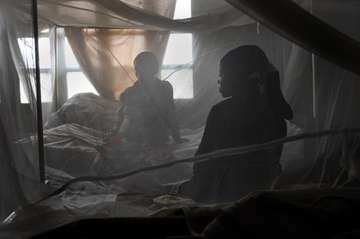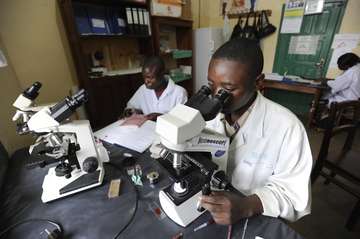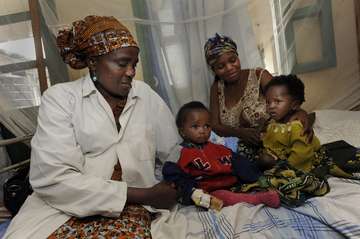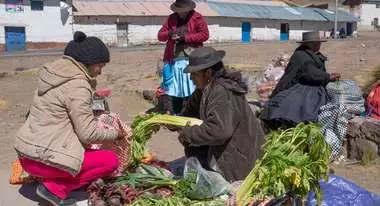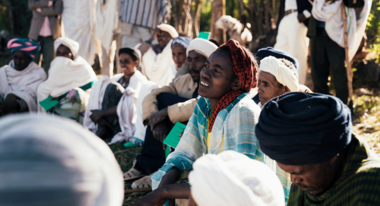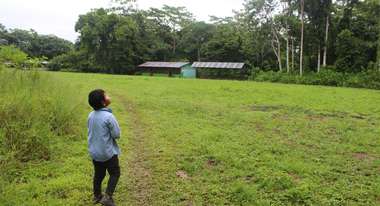A War Against Women
In the year 2000, 15 committed women founded the aid agency Femmes Engagées pour la Promotion de la Santé Intégrale (FEPSI). It operates a hospital in Butembo, where they look after women who have been the victims of rape. Welthungerhilfe has been supporting the hospital for a number of years. Marie Dolorose Masika-Kafanya - former manager and nurse talks about a typical day at the clinic.
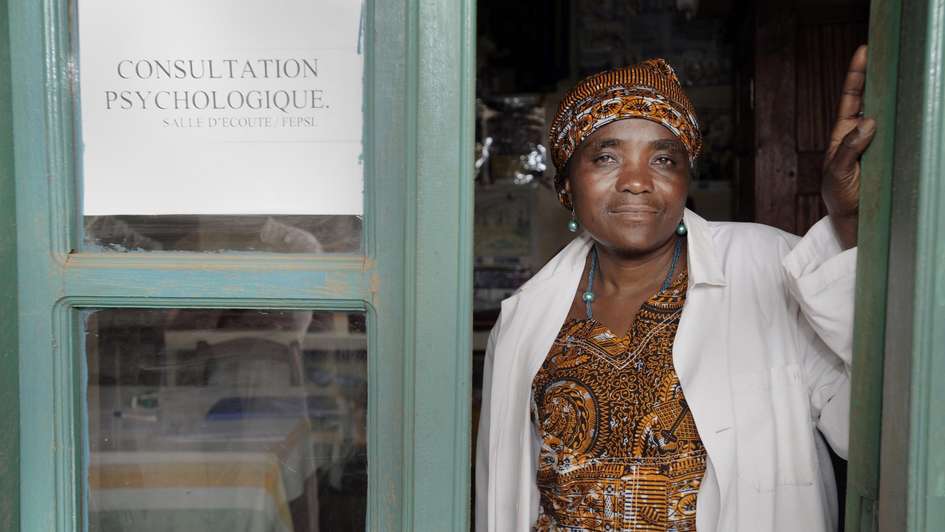
When she tells some of the stories that she has heard over the last 12 years, Marie Dolorose Masika-Kafanya's voice becomes quiet and her tone factual. As if this could take away some of the horror of these words. And the horror experienced by many of the women in the DR Congo, who have been victimised. The 57 year old widow and mother of three says that by comparison, her own life is a very good and blessed life.
This morning, she is leading Love Nziavake along the corridor of the "Centre Hospitalier FEPSI" to the laboratory. The 21 year old can barely walk, she appears almost unconscious, and her gaze is fixed on the floor. The day before, the sugar cane trader was on her way to the field when an unknown assailant pulled her into the bushes and raped her. Her tormentor was around 30 years old and a civilian, but he had a weapon, says the scared woman. The only thing he said to her was: "Today it's your turn."
Nowhere else in the world are so many women raped than in the East Congo. This is confirmed by statistics from the United Nations. Each month, 67 from 1000 women become victims of serious sexual violence. Similarly, no other country in the world has been so exploited and devastated by wars over decades. And nowhere else in the world are there so few morals, pity and integrity.
No water, no electricity
The FEPSI hospital in Butembo is the only place in the two districts of Lubeno and Beni (around two million inhabitants) where rape victims can go for medical and psychological help. Butembo is a city of 700,000 inhabitants, the largest city in East Congo. It is also the least developed city: there is no water or electricity; generators run for two hours during the evening and then darkness falls over the loam huts.
Two, three and sometimes four desperate women knock on the hospital doors every day, says Marie Dolorose Masika-Kafanya. She has counted more than 5,600 over the last twelve years. Each story and each fate is written down in one of the thick blue school binders that are stacked up in a room outside of which hangs the sign "Registration". Many stories are too horrible to be published. The circumstances of the rape of a two-year old girl, for example, violence against an 80-year old women, or documented instances of gang rapes. "Many do not survive the horrible ordeal," says Marie Dolorose.
Fifteen feisty women established the FEPSI project in 2000. Marie Dolorose Masika-Kafanya is one of them. "We could no longer bear it that a society, the whole world, was turning the other way," she says. Shortly thereafter, the women opened the "Centre Hospitalier FEPSI", which has 63 beds, 57 employees and 125 trusted persons, who spread the word about FEPSI in the villages.
Many women become pregnant
Love Nziavake heard about the FEPSI women on the radio, and she has now completed an initial examination. A blood sample was taken in a simple laboratory, in which a microscope is the most state-of-the-art instrument. Marie Dolorose gives her a cup of water and the "morning after pill". Later she will also receive anti-AIDS medication that must be taken within 48 hours. Marie Dolorose asks the scared young woman why she thinks a man would rape a woman. "To destroy the woman's life," says Love Nziavake, and puts her hands in front of her face.
The hospital rooms that are shared by five, and sometimes as many as eight women, are dark. Mosquito netting hangs from the ceilings. Some women are in the last stages of pregnancy and are waiting to give birth. The FEPSI women look after 60 to 80 births every month. Marie Dolorose says that a quarter of these are the result of rape. During the civil war, rape was used as a weapon of war to hurt the family - and hence the opponent's soul.
Before, the typical rapist wore a uniform and weapons: He belonged to a rebel group or the Congolose army. Now it may be the neighbour, uncle or brother. Violence, brutalisation and lawlessness have infected civil society, says Marie Dolorose.
An open ear and support for women
The women of FEPSI cannot really change the situation in their country, as Marie Dolorose Masika-Kafanya also knows. But the aid agency wants to make the situation more bearable for women. Being there. Listening. "The most beautiful moment," says Marie Dolorose "is when a woman learns to smile again after spending a few days at the FEPSI hospital, despite all of the violence and horror that she has experienced." She fights for moments such as these.




